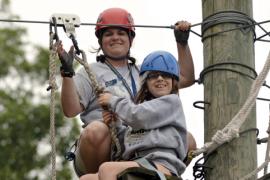Delegation can make you effective or lazy, so, as a camp director, what are the things you should never delegate?
The Mission
Others should be in the room when you’re figuring out the mission; they’ve seen what’s really happening. But once decided, you own the mission. When things are exciting explain how the mission got you there. When things are tough explain why the mission is worth fighting for. The human superpower is to forget things that are really important (which is why the Bible tells us to “remember” 253 times). Make your camp’s mission the exception.
New rule: never have a staff meeting without talking about the mission.
Understanding the Economic Driver
Your mission is a pipe dream unless your program is sustainable. You put everything at risk if you don’t have a clear picture of what allows you to invest in the things that matter. Small expenses and larger income streams matter, because your attention there creates a culture that protects future opportunities.
New rule: let people hear from you about expenses over $1,000 and income streams over $5,000.
Defining A-level Performance
Psychologist, best-selling author, and former NBA player John Amaechi said, “Culture is defined by the worst behavior tolerated” (2021). You are responsible for the cultural feel of your camp. Public applause for A-level performance — or clear action for anything else — will determine what is allowed.
New rule: Praise at least one person for great work at each staff meeting.
Direct Parent Communication
Parents are in charge of their families, and they want to talk to the person(s) in charge of your camp family. Of course there are some important exceptions. Speaking with a nurse about their sick child is a good example, but for the most part, parents speak to parents.
New rule: be more thoughtful about which parent emails you forward to your administrative team.
Understanding the Stakeholders
Camp is for campers. Parents are the customers. Counselors (former campers) are the product. Alumni are the cheerleaders. Vendors are the resources. And public agencies are the gatekeepers. We have responsibilities and opportunities with each of these stakeholders, and it’s your job to put them in order. One forgotten stakeholder is other camp directors. If you stink it up, then everyone’s camp will suffer.
New rule: every time you show the health inspector around, ask yourself, “What am I am doing to help them experience our mission?”
Simplifying the Problem and Mapping the Solution
The problem is always “How do we accomplish the mission more effectively?”
The solution is usually some mixture of people, property, and program. The question to ask is, “Who is responsible for each of these, and what is the one thing they need to do now?” Defining that — clearly and simply — is the most important thing you can do.
New rule: never give anyone a task without having written steps to completion and putting follow-up meetings on your calendar to check that they are on the right path.
What Should Everyone Else Do?
What can your camp staff help with? Two things:
- Creativity. The cliche is that you should fill the room (or camp) with people who are smarter than you. But perhaps you should fill it with people who are more creative instead. If you are good at the six camp director tasks previously mentioned, then you may not always be very fun. However, if you are really good at them, then the people who work with you are empowered to always be creative, and, yes, lots of fun.
- Execution. Camp staff are the tip of the arrow, and you are the fletching helping it fly straight. Remember, it’s the tip of the arrow that does the important part. Your job is to inspire them with the mission — and theirs is to inspire everyone else with the execution.
Reference
- Amaechi, J. (2021, April 20). Building an anti-racist workplace. Worklife with Adam Grant. ted.com/podcasts/worklife/building-an-anti-racist-workplace-transcript
Adam Boyd, DMin, and his wife, Ann, are the executive directors of Camps Merri-Mac for Girls and Timberlake for Boys in Black Mountain, North Carolina. Adam is the author of Jonathan Edwards, Beauty, and Younger Evangelicals and also serves on the board of the North Carolina Youth Camp Association.





